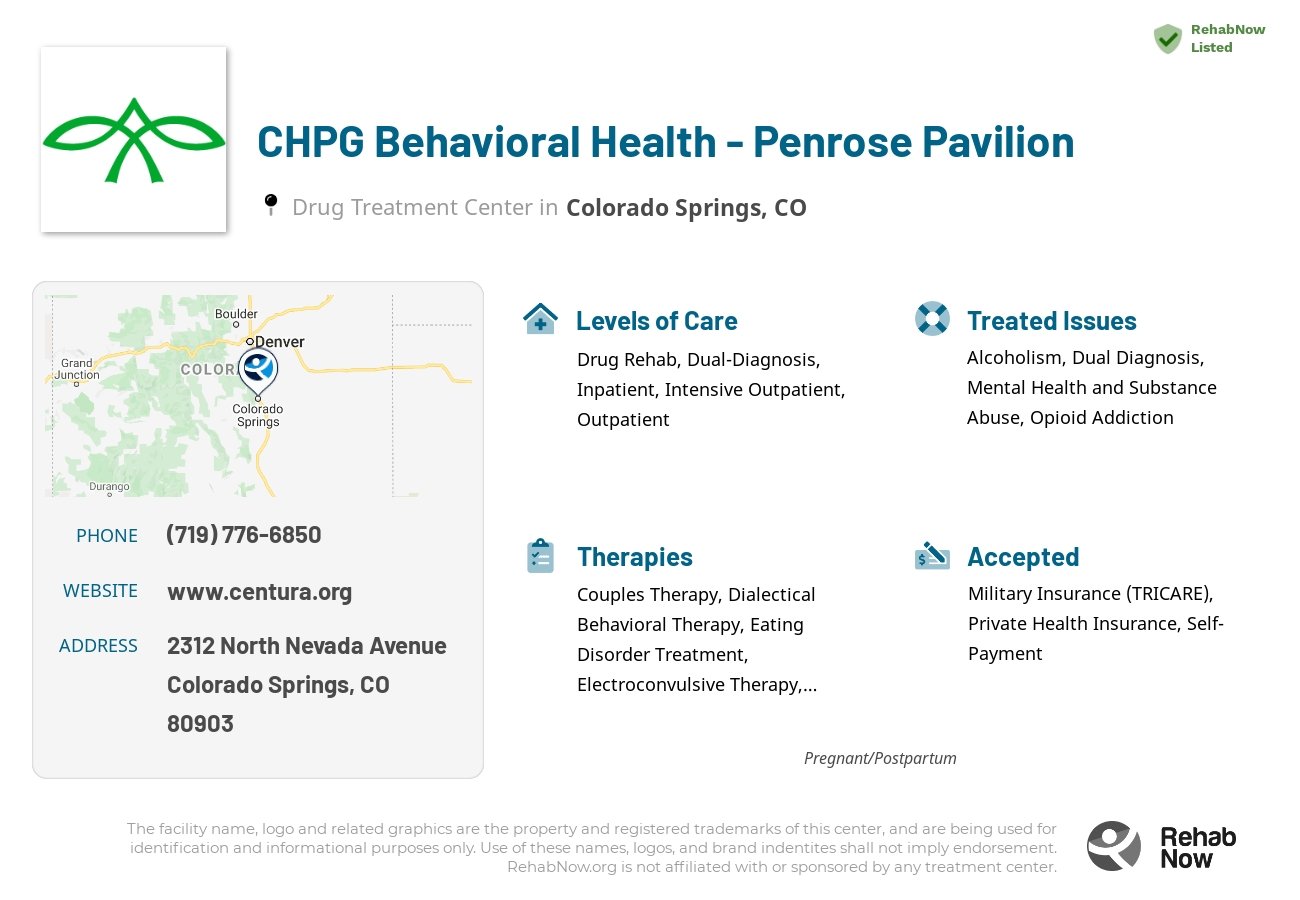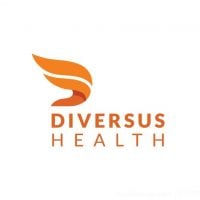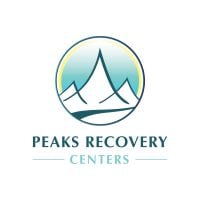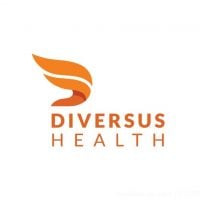CHPG Behavioral Health - Penrose Pavilion
Drug Rehab Center in Colorado Springs, Colorado
CHPG Behavioral Health - Penrose Pavilion in Colorado Springs offers comprehensive addiction and substance abuse services, including individual and group therapy, family therapy, medication management, and supportive services such as recreation and support groups, to help patients succeed in their recovery with the highest quality of care.
About CHPG Behavioral Health - Penrose Pavilion in Colorado
CHPG Behavioral Health - Penrose Pavilion in Colorado Springs, Colorado is a comprehensive Addiction Treatment Facility dedicated to providing dedicated, personalized, and compassionate care to individuals and families who are struggling with substance abuse and addiction issues. The facility offers integrated treatment options through their continuum of care including Inpatient, Intensive Outpatient, and Outpatient levels of care. CHPG Behavioral Health - Penrose Pavilion is accredited by the Commission on Accreditation of Rehabilitation Facilities and licensed by the Colorado Department of Public Health and Environment.
CHPG Behavioral Health - Penrose Pavilion provides specialized care for individuals with alcoholism, dual diagnosis, opioid addiction, eating disorders, and drug addiction. Treatment options range from evidence-based psychotherapy, cognitive behavioral therapy, and group therapy, to more holistic options, including mindfulness, meditation, and KUNDALINI yoga/breathwork. Additional services include medication-assisted treatment, detoxification, and family therapy. CHPG Behavioral Health - Penrose Pavilion accepts private health insurance and aims to make treatment as accessible and affordable as possible.
Genders
Ages
Modality
Additional
Conditions and Issues Treated
Treatment for opioid addiction is best made with the help of medical professionals who are experienced in dealing with these types of drugs. This treatment can involve medications, exercise, behavioral therapy, and counseling sessions. It is important to note that the effectiveness of treatments for opioid addiction vary, so it is vital to research which treatment options are suitable for each individual.
Many people who struggle with opioid addiction need to attend specific programs like methadone , Suboxone or Vivitrol clinics.
These types of programs will provide the patient with legal, prescription medications that can help them overcome their cravings for illegal opioids like heroin or fentanyl . If the patient has a chronic condition like Hepatitis C, they must undergo treatment before they can begin taking these medications.
Individuals who are addicted to drugs and/or alcohol often have one or more co-occurring mental health disorders. Addressing both the addiction and the mental health problems at facilities like CHPG Behavioral Health - Penrose Pavilion can be very beneficial for these individuals.
Common mental health conditions that often co-occur with addiction include:
- Anxiety Disorders – People with drug and alcohol problems often suffer from anxiety disorders such as panic disorder, obsessive-compulsive disorder, social anxiety disorder, and generalized anxiety disorder.
- Depression – One of the most common mental illnesses co-occurring with addiction is major depressive disorder.
- Attention-deficit hyperactivity disorder (ADHD) – Many people with drug and alcohol problems also suffer from ADHD.
- Bipolar Disorder – People with bipolar disorder are more likely to suffer from drug and alcohol problems than the general population, and vice versa.
Levels of Care Offered
This center offers a variety of custom treatment tailored to individual recovery. Currently available are Drug Rehab, Dual-Diagnosis, Inpatient, Intensive Outpatient, Outpatient, with additional therapies available as listed below.
Inpatient recovery offers individual therapy, groups, and family therapy. The length of inpatient addiction treatment depends on the addict and their addiction. Inpatient rehab is a costly drug treatment, costing anywhere from $30k- to $60k. However, insurance often offers help in covering these costs.
An intensive outpatient treatment program, or IOP, is set up for those struggling with an addiction to begin the recovery process. However, the patient will not live at the facility during treatment.
IOP involves patients coming in and out of a medical office building regularly to receive therapy and other services while continuing their life outside of these visits.
IOP is a step up from drug detoxification or alcohol detox. However, it’s still considered a phase of recovery rather than the ultimate goal. There are many rehabs and treatment facilities available to patients in need of IOP.
Outpatient treatment can be considered the lowest intensity level of addiction treatment in Colorado Springs, CO. It is ideal for early phase addiction or lower intensity addictions. CHPG Behavioral Health - Penrose Pavilion peer group support, 12-step programs, and individual counseling are likely to be involved.
Therapies & Programs
Individual therapy is ideal for addicts who want to focus on themselves. It can also be helpful for those whose withdrawal symptoms are exacerbated by the presence of other people.
Benefits of individual therapy are:
- Access to a personalized treatment plan that focuses on the individual needs of the addict
- More privacy during treatment sessions
- Better personal development through introspection
- Increased self-awareness regarding addictive tendencies in order to avoid relapse
- Greater potential for a long-term recovery plan
- Receiving professional advice and detox assistance from medical staff
Couples therapy is a treatment method used to help couples in which at least one member of the couple has a drug addiction. Couples therapy can be used whether the addicted partner is using drugs or in recovery. An additional benefit of couples therapy is that it can help make other types of treatment, such as 12-step programs, more effective.
Family therapy can help you and your family deal with old issues that may trigger substance abuse. The idea behind family therapy for drug addiction is that you are never fully healed from substance abuse until you’ve healed your relationship with your family, too. To get sober, you need to find a different way to cope with the pain in your life.
This is when a group of people in various stages of recovery meet up and discuss their experiences, triggers, successes, failures, and even alternative therapies! Unlike support groups where everyone already knows each other, group therapy is conducted along side outpatient or inpatient treatment at CHPG Behavioral Health - Penrose Pavilion.
Trauma therapy is a clinical process that helps individuals deal with mental stress often caused by traumatic events. The therapist helps the person identify, understand and work through the problem. This is done with the help of talking about it in group or one-on-one counseling sessions.
Therapists use relaxation, role-playing, art, and music to help the person open up about what is bothering them. Some examples include:
- Talking about the traumatic event and how it affected them.
- Helping those who have PTSD to deal with their nightmares and recurring memories.
- Working with individuals to resolve the issues triggering the stress, whether seeing someone who reminds them of what happened or feeling helpless.
The individual is also encouraged to help others that are struggling with similar problems. This often helps them feel empowered and gives them hope.
Trauma therapy is not for everyone; it is usually reserved for people who have recently experienced a traumatic event and struggle to get over it. It is generally done for children, teenage victims of sexual assault, and war veterans.
Dialectical Behavior Therapy (DBT) is used by drug treatment centers across the United States to help drug addicts become sober. DBT is a type of Cognitive Behavioral Therapy (CBT) that combines traditional behavioral treatments with elements from DBT, including dialectics, distress tolerance, and interlocking issues. Some of the negative behaviors associated with addiction, such as impulsivity and mood swings, are addressed in DBT, while others like craving and isolation are not. It is commonly used to treat Borderline Personality Disorder (BPD) along with substance abuse disorders.
The four DBT modules are mindfulness, interpersonal effectiveness, emotion regulation, and distress tolerance:
- Mindfulness helps recovering addicts learn to identify and experience their emotions while realizing that they are not permanent.
- Interpersonal Effectiveness includes assertiveness, asking for what you need, and saying no while improving communication skills.
- Distress Tolerance has recovering addicts learn how to tolerate distress at the moment and avoid resorting to substance abuse.
- Emotion Regulation is used to identify, express and change emotions.
CBT is a psychotherapy approach and method. [ws-nap-name] people to examine how their thoughts, including habitual harmful and inaccurate thinking, affect their actions. CBT is based on the idea that rigid, inflexible thinking leads to poor stress management, which leads to emotional distress.
Similarly, CBT helps people identify and change negative behaviors. It makes you question your perceptions and ask if they are realistic. CBT asks people to examine their behaviors and emotional responses and how they affect their lives. CBT aims to change people’s thinking and behavior to lead a more balanced and healthy life.
Moreover, CBT has been shown to reduce anxiety disorders, depression, and symptoms associated with harmful thoughts or actions.
Payment Options Accepted
For specific insurance or payment methods please contact us.
Is your insurance accepted?
Ask an expert, call (888) 674-0062
Additional Details
Specifics, location, and helpful extra information.
Colorado Springs, Colorado 80903 Phone Number(719) 776-6850 Meta DetailsUpdated November 25, 2023
Staff Verified
CHPG Behavioral Health - Penrose Pavilion Patient Reviews
There are no reviews yet. Be the first one to write one.
Colorado Springs, Colorado Addiction Information
The Centennial State has slipped to a ranking of 12th in the country for drug abuse. Each year around 24% of the state's population uses illegal drugs while nearly 5% of its population abuses alcohol. Substance-related deaths in Colorado were responsible for 15.12% between 2008 and 2017. Fortunately, Colorado drug and alcohol addiction treatment are available to help a person overcome addiction.
10.6% of Colorado Springs adults reported binge drinking and 11.7% of adults reported using illicit drugs. From 2006 to 2016, the number of drug overdose deaths more than tripled in Colorado Springs. Drug addiction can lead to a wide variety of problems, including crime, violence, and health issues. It's important to find a facility that offers the level of care you need to give yourself the best chance for success.
Treatment in Nearby Cities
- Las Animas, CO (102.7 mi.)
- Golden, CO (65.2 mi.)
- Denver, CO (61.1 mi.)
- Gunnison, CO (115.7 mi.)
- Del Norte, CO (116.9 mi.)
Centers near CHPG Behavioral Health - Penrose Pavilion
The facility name, logo and brand are the property and registered trademarks of CHPG Behavioral Health - Penrose Pavilion, and are being used for identification and informational purposes only. Use of these names, logos and brands shall not imply endorsement. RehabNow.org is not affiliated with or sponsored by CHPG Behavioral Health - Penrose Pavilion.









